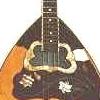|
|
When Papadakis moved to Athens, he was eighteen years old and was already a good violin player. He performed at Athens Radio once a week: he says that he was the only musician who performed the musical repertory of Crete, aside from two musicians who were invited once or twice a year from Crete (Mavros, another violin player, and Koutzourelis, a laouto player). This demonstrates that Greek mass media took an interest in folk music already in the 1930s and Cretan violinists were well-known as good players. |

bouzouki |
One could not earn a living performing Cretan music at Athens Radio. But in Athens another musical repertory was played, the rebetika (sing., rebetiko) songs, an urban popular genre widespread in the underworld. Papadakis learned to play the main rebetic instrument, the bouzouki (pl., bouzoukia), a long-necked, fretted lute resembling the Turkish saz, and he became a rebetis, a denizen of the rebetic world. |
|
|
This meant much more than a simple change of instrument and repertory. To be a rebetis in Athens during the 1930s meant to belong to a world characterized by social ostracism and existential precariousness as well as to take part in a true urban sub-culture which found an important element of identity and expression in its music. For Papadakis to be a rebetis was not an existential choice, as it was for other rebetic musicians. But certainly it was a meaningful experience of an outcast condition that was far from the one he experienced in Crete. The worlds of urban or laikí music (which includes the rebetika) and folk or dimotikí music (the music of Greek villages) differ in musical and textual repertories, but also the status of musicians. The rebetic musician is typically the musician of the underworld who shares with his audience a condition of social outcast and revolt symbolized by his own repertory (see also the rebetika). |
|
|
Papadakis lived in Athens from 1938 until 1945 and shared the usual environment of rebetic players: the world of the taverns of Druba, the ill-famed slums of Piraeus, where he had occasion to play together with other famous rebetic players, such as Kaldaras and Petsalis. These were the years of World War II; Athens was soon occupied, record companies closed. After the war Papadakis was drafted into the navy. He got the nickname "Naftis" (sailor) from playing in the harbors wearing his uniform. He was known as a musician with this nickname from then on. |
Papadakis sings and plays "Duru-duru," a tabachaniotiko song |
After his military service Papadakis returned to Crete
in 1945, bringing with him his experience and repertory as a rebetic
player. In Chaniá he founded an instrumental group where
he played bouzouki with other musicians,
refugees from Asia Minor. The group played
the rebetika and the tabachaniotika (sing., tabachaniotiko). This urban Cretan music merging Greek and Turkish elements could be easily combined together with the rebetika in the repertory played in cafés and in taverns in the harbor district. Papadakis's group performed in a tavern in the ill-famed harbor slums of Chaniá. He re-created for himself in Crete the same musical and social situation just experienced in Athens and Piraeus. |
|
|
But soon he had the occasion to begin playing again for weddings and returned to the violin. Thus, he went back to the more rewarding and socially respectable status of demotic musician. For Papadakis, this was a sort of return to his origins as a musician. But it was only a temporary return because of the continuing vendetta threat. In these years, his family emigrated to Australia, and he got married with a Greek-American woman, making possible emigration to the U.S. However, for some years more Papadakis lived in Greece, in Athens, where he played violin for a "Chaniá club" (from 1949 until 1953) and in Chaniá (from 1953 until 1959). |

